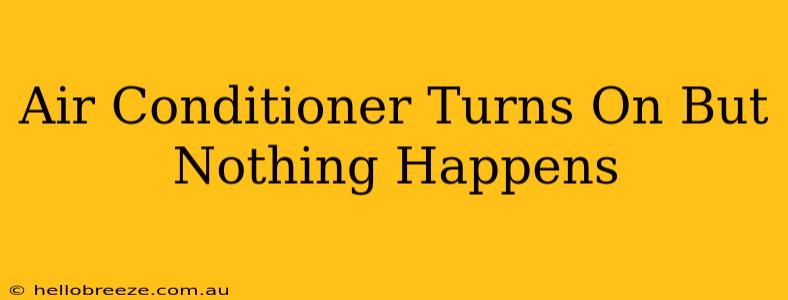Is your air conditioner turning on, but nothing else is happening? That frustrating whirring sound without the cool air is a common problem, but don't panic! This troubleshooting guide will help you diagnose and potentially fix the issue, saving you the cost of an immediate service call. We'll cover the most common culprits and guide you through simple checks you can perform yourself.
Common Reasons Your AC Turns On But Doesn't Cool
Several issues can cause your AC unit to power up but fail to produce cold air. Here are some of the most frequent causes:
1. Frozen Evaporator Coil:
This is a very common problem. A frozen evaporator coil prevents airflow, meaning your AC can run but won't cool. This is often caused by:
- Dirty Air Filter: A clogged filter restricts airflow, leading to ice buildup. Check and clean or replace your air filter immediately. This is often the easiest fix!
- Low Refrigerant: Insufficient refrigerant reduces cooling capacity and can lead to freezing. This requires professional attention.
- Restricted Airflow: Obstructions like furniture or curtains blocking vents also contribute to freezing. Ensure vents are clear.
Solution: If you find a frozen coil, turn off your AC completely to allow it to thaw. Once thawed, address the underlying cause (dirty filter, etc.).
2. Refrigerant Leaks:
Low refrigerant is a major reason for poor cooling. Refrigerant is essential for the cooling process, and leaks are common due to wear and tear or accidental damage.
Symptoms: Besides freezing, you might notice:
- Weak airflow: Even after thawing, airflow remains weak.
- Warm air blowing: The air coming from the vents is only slightly cooler than the ambient temperature.
Solution: Refrigerant leaks require professional repair. Do not attempt to recharge the refrigerant yourself. This should only be handled by qualified technicians.
3. Faulty Capacitor:
The capacitor is a crucial component responsible for starting the compressor. A failing capacitor can lead to the unit powering on but the compressor not engaging.
Symptoms: You might hear a faint hum or clicking sound but no compressor activity.
Solution: Capacitor replacement requires some electrical knowledge. If you're not comfortable working with electricity, call a qualified technician.
4. Compressor Problems:
The compressor is the heart of your AC system. A failing compressor means no cooling, despite the unit powering up. This is a more serious and costly repair.
Symptoms: Similar to a faulty capacitor, you might hear unusual sounds or no compressor activity at all.
Solution: Compressor replacement is a significant repair. You definitely need a qualified HVAC technician for this issue.
5. Electrical Issues:
Problems with wiring, breakers, or the power supply itself can prevent the AC from functioning correctly.
Symptoms: The unit might power on intermittently or not at all. Check your breaker box for tripped breakers.
Solution: Inspect your electrical panel and wiring connections. If you're uncomfortable, call an electrician.
Preventing Future AC Problems
Regular maintenance is key to preventing many of these issues:
- Change your air filter monthly.
- Schedule annual professional maintenance checks. This allows technicians to identify and address potential problems before they become major issues.
- Keep vents and air returns clear.
When to Call a Professional
While some simple checks can resolve minor issues, it's crucial to call a qualified HVAC technician if:
- You suspect a refrigerant leak.
- Your compressor is not working.
- You're uncomfortable performing electrical work.
- The problem persists after troubleshooting.
Ignoring a malfunctioning AC can lead to further damage and higher repair costs. Addressing the issue promptly will ensure your home stays cool and comfortable all season long!

